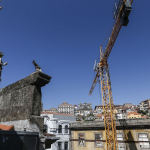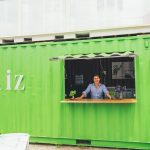The big business of international schools
Demand for international school education in Portugal is at an all-time high. But with long waiting lists, is supply meeting demand?
There have never been so many foreign residents living and working in Portugal. According to a recent report from the country’s immigration service SEF, published in June, there are now over 480,000.
The number of French, Italian and even British citizens (concerned over Brexit) has been steadily rising over the past few years taking advantage of Portugal’s generous Non-Habitual Resident (NHR) scheme.
Most from outside the European Union are Brazilian, but there are many Chinese, South African, Russian and Middle Eastern citizens taking advantage of Portugal’s Golden Visa Residency by Investment programme (ARI) and the recently launched Tech Visa, a new measure introduced to attract talent to Portugal.
By way of comparison, there was an increase of 13.9% on 2017 (the year in which the number of immigrants reached 421,300), the largest increase since 2002 and probably the largest influx of overseas immigrants since the dark years of World War II.
Growing demand
With the influx of overseas residents, there has been an exponential growth in demand for top-quality private education with a number of new international schools slated to open in time for the 2019 academic year.
One such is the new British School Lisbon (BSL) in the capital’s downtown. The project from The Schools Trust involves the adaptive reuse and expansion of a listed 18th century building – once the Royal Mint – with modern facilities.
The school, which so far has enrolled 60 pupils but will cater for 120 pupils aged three to eight, was unveiled this year by Headmaster David Laird in the presence of the British Ambassador to Lisbon, Chris Sainty, the Chair of the British-Portuguese Chamber of Commerce, Filipe Lowndes Marques, and a Trustee of The Schools Trust, Jessica Ordovas Ussia.
BSL will initially serve as a primary school but will continue to open consecutive year groups in subsequent years until a full secondary school is realised.
“We were just so lucky. We found a site which already had a licence, after looking at around 100 buildings, signed in December and will open in September,” says The Schools Trust Development Manager, Ashley Andrews. “Now is the time when all the right factors and demand have come together, and we want to catch the wave.”
An Educational Hub
Another is the new United International School of Lisbon, which will form part of a wider educational hub – Edu Hub.
The €70 million development project, located on a 30,000sqm site on Avenida Marechal Gomes da Costa – in the now defunct premises of the Universidade Independente close to the Parque das Nações (former Expo’98 site) -, comes from the Martinhal Group, which owns and manages a number of family-orientated hotels and resorts in the Greater Lisbon area and the Algarve.
“We are acting as investor developers, not managers, on the project. In 2017, the property management consultants Cushman & Wakefield had the land available which was held by a private fund. We had approached 10 different operators and we chose International Schools Services (ISS) from Princeton, New Jersey,” says Chitra Stern, entrepreneur, real estate developer, university lecturer and owner/founder of Martinhal Family Hotels & Resorts.
The project has been well thought out, with plans to build a community nearby, which includes office, startup and coworking spaces, a hotel and an assisted living residence for the elderly.
Works on the school began in July with the aim of meeting the lack of supply of international schools in the eastern part of Lisbon. The school, which will have an American curriculum, will cater for children from kindergarten age to the 12th year (K-12) and intends to offer the International Baccalaureate (IB) as an option for the last two years of school grades (Grades 11 and 12).
“The sudden growth in international schools is, in part, down to a happy combination of events, which came together at the same time,” says Chitra Stern.
“We had just emerged from a recession, when some schools saw a modest exodus, followed by sudden growth with the economic recovery.
“Nothing happens by accident. A lot of factors are behind this growth: an increasing number of families moving to Portugal, the buoyant startup scene, company relocations, the growth in shared services centres, near-shoring (transferring a business operation to a nearby country) and even Brexit all factored.”
Sunshine and security
Certainly, there were other factors, too. Instability in the Middle East and North Africa led to an exodus of both capital and families from Iran, Syria and the Gulf states to Portugal. Economic and political insecurity in Brazil and South Africa had a similar effect, whereby successful entrepreneurs wanted a safer haven in more secure surroundings for their families and children, including education.
There are those who have discovered the sunny climate and relaxed lifestyle in Portugal. A country which, according to the Global Peace Index, is the third safest country in the world in which to live.
Schools have been trying to react. With the demand increase from 2017, there was news that the Lycée Français Charles Lepierre in Lisbon and St. Peter’s International School in Palmela, south of Lisbon, were expanding their premises, but it is easier said than done Both land and planning permissions are needed.
St. Julian’s International School in Carcavelos, near Lisbon, for example, is said to have had plans to expand and renovate its premises for some time, but often the reaction time is the issue.
Exporting prestigious brands
The international expansion of international schools on a global level has mushroomed over the past 20 years, so much so that the entire scene for international education has seen a revolution.
The middle to upper class brackets in emerging countries Brazil, Russia, India and China (BRIC) have enjoyed considerable growth in wealth and these families want the best education for their families, sending them to boarding schools in the UK, US and Switzerland. Universities in the UK, Canada, the US and Australia are benefitting too, since education is one of their key exports.
To prepare children for these universities, there has been a huge growth in private high school/‘A’ level education. This has led, in turn, to the growth of international school chains, which are now extending their brands in the source countries of demand in areas like China and South East Asia.
The overseas market is increasingly enticing UK independent schools that see the international successes of British brands such as Harrow, Repton, Sherbourne, Marlborough and Dulwich.
For example, Sherbourne School opened a school under the same brand in Qatar and Marlborough College opened one in Malaysia. Finding the right partner on the ground is often vital and a decision on what the school intends to be in terms of model.
Questions need to be addressed. Is the international school going to be one that reflects and is an expansion of the school in the country of origin, or is it going to be a franchise model and just take a cut of the surplus?
Then, the rules and regulations of the country need to be studied, due diligence and market feasibility need to be undertaken and having the correct legal advice on the ground are all vital for long-term success.
FDI and investment
“The Algarve international schools’ scene was dominated by mainly English residents for many years, but now there are French, Dutch, Chinese and Russian. The market in Portugal is changing. The Golden Visa has had a huge impact and part to play in changing the landscape of international schools,” explains Chitra Stern, who is also an advisory member for the government’s Portugal IN – a Foreign Direct Investment Taskforce.
“Believe it or not, the number one reason for FDI globally is education. This means having to have the educational opportunities to attract FDI. People with families are not going to relocate and set up a business if they don’t feel there is the right educational infrastructure in the country, city or area they are thinking of investing in” stresses Chitra Stern.
A part of a report produced in 2017 for Portugal IN revealed a lack of spaces available in international schools in Portugal.
Chitra Stern says one problem is the restrictions on spontaneous expansion to meet market demand because many international schools are run by foundations.
“Foundation schools can’t just expand rapidly. Foundations normally are not run for profit so they can’t just take sudden risks without meticulous financial planning. They need to ensure adequate equity,” she explains.
From North to South
Demand is being felt and met in Portugal’s sunny holiday region of the Algarve, too, with a new pre-preparatory and preparatory international school which will open in September near Loulé.
The Eupheus School is marketed as a new state-of-the-art, selective school for three to 11-year-olds on a purpose-built site located to the south side of town, a short distance from junction 12 of the A22 motorway.
The school is a project from a small team of experienced educationalists. One of the visionaries of the original Eupheus concept, Ms. Penelope Best, will be Head of School. Best is a highly-experienced Primary Head, well known for her educational and philanthropic endeavours in the Algarve over the past 18 years.
“At Eupheus, we have created a Primary school where children can learn in a safe and supportive environment that will allow them to embrace diverse learning strategies and lead them to achieve their own specific educational goals.
Penelope Best says that the school’s location on the edge of the Algarve’s Golden Triangle, famous for its gated luxury communities and golf resorts, together with a number of affluent foreign communities living in and around Vilamoura, Almancil and Faro also weighed heavily on the decision to open the school.
“The time was right, the area has many wealthy families and there is a clear demand for elite primary and secondary education,” Best says, adding her aim is to create a 21st century school with fully-qualified teachers and Apple distinguished technology products (i.e., Eupheus i.Pad).
So far, the school has 40 children signed up with many more admissions expected by the end of the summer and with plans to open a secondary on an adjoining site.
“British families used to make up the lion’s share of pupils in international schools in the Algarve. No more. The demographic has changed substantially with parents from France, Germany, Russia and the Middle East enrolling their children in international schools now,” she explains.
All teachers at the pre-prep and preparatory school, which is being funded by private investors specialising in international schools projects, must have Qualified Teacher Status (QTS), while school fees will range from €9,990 from reception to 11 years of age and €13,000 in the secondary levels of year 7, 8 and 9.
Long waiting lists
Certainly, the above-mentioned projects have arisen to meet demand for high-quality education in Portugal. In 2018, however, many schools had no vacancies and most of the establishments that Essential Business talked to reported a perennial problem of long waiting lists with literally hundreds of pupils.
St. Julian’s International School in Carcavelos, with 1,000 students, is perhaps one of the oldest and most prestigious private preparatory schools in the Greater Lisbon region.
The bilingual school with 45 nationalities, and which can name Portuguese London-based painter Paula Rego among its famous past pupils, is certainly one of the most expensive with 1st year fees at €11,412 rising to €22,560 by the 12th year.
St. Julian’s actually closed enrollments in January for 2019 because “we had lots of applicants and didn’t want to raise false expectations”. For this year, it filled all of its vacancies and the school has, in general terms, reached capacity.
The British international school founded in 1932 and set in eight hectares of land confirmed through its spokesperson Catarina Coelho that: “We do confirm that demand has increased considerably in recent years from families worldwide, more specifically in the past five years.”
The school advises parents to apply sooner rather than later, with waiting times varying considerably.
Soaring demand has also been reported from the Nobel International School Algarve near Lagoa.
“We’ve seen pupil demand increase year-on-year, especially over the past five years,” says Head of School Mike Farrer, who cautions that long waiting lists are not always “a reflection of the demand but often reputation and word-of-mouth panic at a perceived lack of places”.
“We are currently at full capacity and have waiting lists for some classes and year groups with some of these for enrolments in 2022. International school communities are very mobile, however, and no end of reasons can cause a sudden flurry of interest or departures. It is important to be able to respond to changes in population,” says Farrer.
It is a similar story with the Vale Verde International School at Montinhos da Luz near Lagos. “We’ve seen an approximate 100% increase in demand since 2009, 50% since 2014 and a 20% increase over the past three years,” says Director Louise de Beer, who founded the school in 2002 – it currently has a licence for 180 students.
Louise de Beer believes that supply is meeting demand, despite the growing interest in the region because of its geographical location, and has noticed a spread of clientele from eastern to western Algarve and says that waiting lists are typically one year.
“We only enroll students one academic year in advance, with most of them from the European Union and United Kingdom, but lately we have been seeing more students from the Gulf states, Middle East and Brazil,” she says, adding that referrals come mostly by word-of-mouth while the climate and relative safety and security of Portugal are all factors as to why there has been an increase in demand for international schools.
Company relocations
To these factors is added an increasing number of company relocations, with many multinationals located in the several business parks on the outskirts of Lisbon towards Oeiras and Cascais.
One school which has placed itself strategically within this business catchment area is the International Sharing School at Taguspark, near Oeiras, a project which began in 2018 and will start in September 2019 with the international community representing 85% of its total pupils.
“Right now, supply is not meeting demand. There are huge waiting lists at almost all international schools in the Greater Lisbon area and demand will continue as the amount of companies moving to Lisbon continues,” says Miguel Santos, CEO of International Sharing School.
Considered a boutique school, its Taguspark campus has a capacity for 350 students and has recently acquired another building within Taguspark, which will enable the school to expand to take 1,000 pupils.
“Lifestyle, climate and safety are undeniably Portugal’s greatest assets and we have also seen some enrollments due to job relocation. There are many EU and UK citizens moving to Lisbon for work purposes and we have seen these markets growing due to company relocation. China used to be a big market in the past, but we have seen this market decreasing in the last couple of years. On the other hand, we have been experiencing significant growth from the Brazilian market over the past two years,” says Santos.
Maria Barral, Development, Marketing and Communications Manager at Carlucci American International School of Lisbon (CAISL), says: “We’ve noticed an increase in demand, especially in recent years.”
Founded in 1956 and located between Cascais and Sintra, CAISL is the only American school in Portugal supported by the Department of State and is one of the few not-for-profit international schools. The purposely-built campus underwent further construction in 2011 to provide all the amenities and services desired, becoming one of the most complete facilities in the country.
“The number of prospective students increased incrementally until the past couple of years when it spiked at 150% in terms of growth. After reaching what the school considers “capacity” in 2015-2016, the number of students did not change significantly. Our focus has been to develop and keep the best conditions for learning including small class size, the right technology and the best resources, not so much to grow in numbers.”
Indeed, she says that, for the past three to four years, demand has exceeded supply. “It is unpredictable and unknown if this economic growth of international clientele will continue or if it is a ‘bubble’.”
Prepared to pay
The austerity years in Portugal (2011-2015) are a recent memory. Currently, there are many schools claiming to be international with English as the medium of instruction or Portuguese/English bilingual establishments that have just opened or are about to open soon.
It is impossible to know if this additional supply will meet the demand or, if by the time they are established, the demand will have diminished,” Barral adds.
“This a very interesting time for Portugal in terms of overseas investors, especially with all the residency tax programmes in Portugal since 2013 – the NHR, Golden Visa, Tech Visa, Startup Visa – all of which have contributed, in a big way, to the changing landscape of demand and eventual supply of schools to meet it,” concludes United Lisbon International School developer, Chitra Stern.
Text: Chris Graeme










